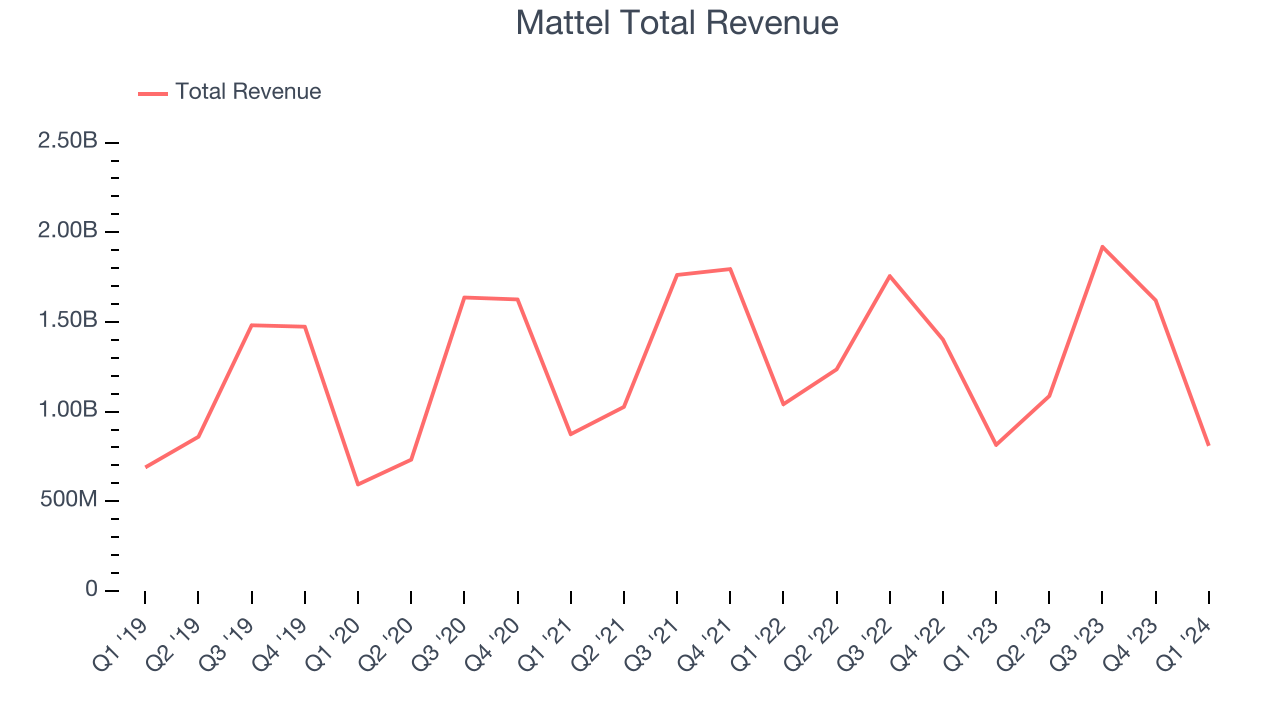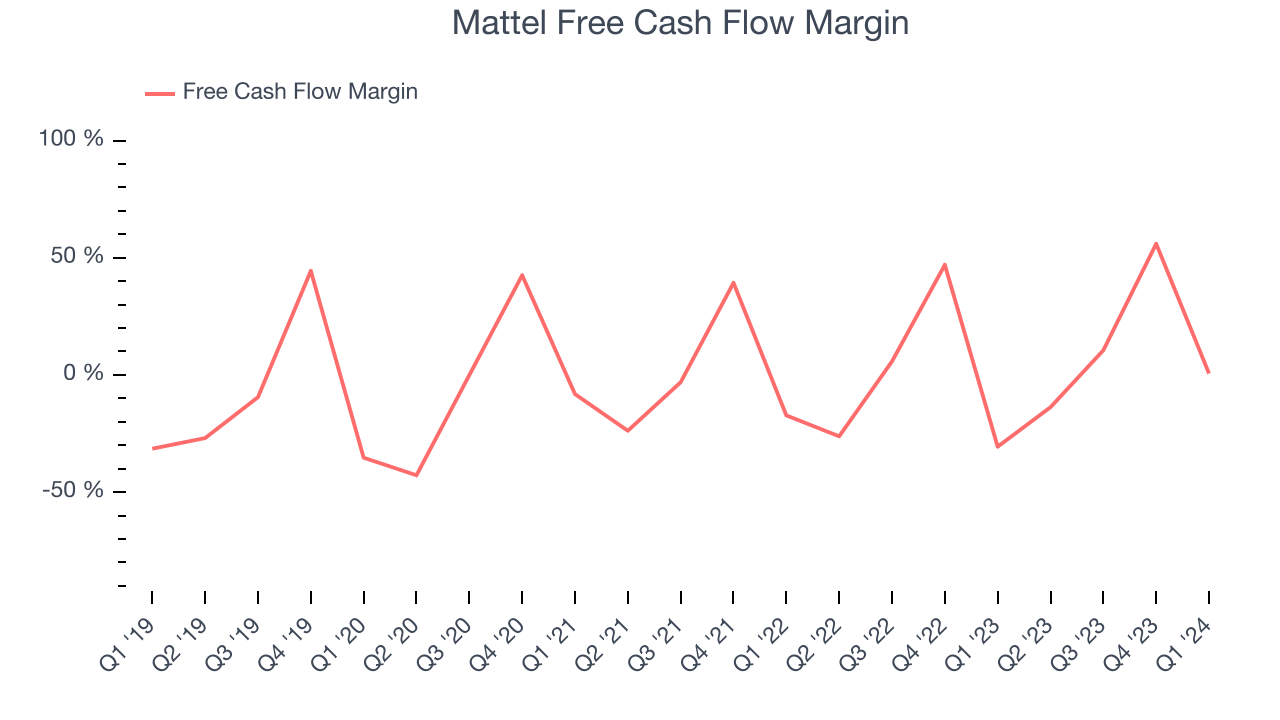Toy manufacturing and entertainment company (NASDAQ:MAT) fell short of analysts' expectations in Q1 CY2024, with revenue flat year on year at $809.5 million. It made a GAAP loss of $0.08 per share, improving from its loss of $0.30 per share in the same quarter last year.
Is now the time to buy Mattel? Find out by accessing our full research report, it's free.
Mattel (MAT) Q1 CY2024 Highlights:
- Revenue: $809.5 million vs analyst estimates of $832.9 million (2.8% miss)
- EPS: -$0.08 vs analyst estimates of -$0.14 (41.8% beat)
- Full year EPS guidance of $1.40 (in line)
- Gross Margin (GAAP): 48%, up from 40% in the same quarter last year
- Free Cash Flow of $5 million, down 99.4% from the previous quarter
- Market Capitalization: $6.41 billion
Ynon Kreiz, Chairman and CEO of Mattel, said: “We are off to a good start to the year with significant gross margin expansion, positive Adjusted EBITDA, and very strong improvement in free cash flow. Trends in consumer demand for our product improved through the quarter and we expect to outpace the industry and gain market share in 2024. We are executing our strategy to grow our IP-driven toy business and expand our entertainment offering.”
Known for the creation of iconic toys such as Barbie and Hotwheels, Mattel (NASDAQ:MAT) is a global children's entertainment company specializing in the design and production of consumer products.
Toys and Electronics
The toys and electronics industry presents both opportunities and challenges for investors. Established companies often enjoy strong brand recognition and customer loyalty while smaller players can carve out a niche if they develop a viral, hit new product. The downside, however, is that success can be short-lived because the industry is very competitive: the barriers to entry for developing a new toy are low, which can lead to pricing pressures and reduced profit margins, and the rapid pace of technological advancements necessitates continuous product updates, increasing research and development costs, and shortening product life cycles for electronics companies. Furthermore, these players must navigate various regulatory requirements, especially regarding product safety, which can pose operational challenges and potential legal risks.
Sales Growth
Examining a company's long-term performance can provide clues about its business quality. Any business can put up a good quarter or two, but the best consistently grow over the long haul. Mattel's annualized revenue growth rate of 3.6% over the last five years was weak for a consumer discretionary business.  Within consumer discretionary, product cycles are short and revenue can be hit-driven due to rapidly changing trends. That's why we also follow short-term performance. Mattel's recent history shows a reversal from its already weak five-year trend as its revenue has shown annualized declines of 1.7% over the last two years.
Within consumer discretionary, product cycles are short and revenue can be hit-driven due to rapidly changing trends. That's why we also follow short-term performance. Mattel's recent history shows a reversal from its already weak five-year trend as its revenue has shown annualized declines of 1.7% over the last two years.
This quarter, Mattel missed Wall Street's estimates and reported a rather uninspiring 0.6% year-on-year revenue decline, generating $809.5 million of revenue. Looking ahead, Wall Street expects revenue to remain flat over the next 12 months.
Unless you’ve been living under a rock, it should be obvious by now that generative AI is going to have a huge impact on how large corporations do business. While Nvidia and AMD are trading close to all-time highs, we prefer a lesser-known (but still profitable) semiconductor stock benefitting from the rise of AI. Click here to access our free report on our favorite semiconductor growth story.
Cash Is King
Although earnings are undoubtedly valuable for assessing company performance, we believe cash is king because you can't use accounting profits to pay the bills.
Over the last two years, Mattel has shown decent cash profitability, giving it some reinvestment opportunities. The company's free cash flow margin has averaged 10.8%, slightly better than the broader consumer discretionary sector.

Mattel broke even from a free cash flow perspective in Q1. This quarter's result was great for the business as its margin was 31.2 percentage points higher than in the same period last year.
Key Takeaways from Mattel's Q1 Results
We were impressed by how significantly Mattel blew past analysts' EPS expectations this quarter. We were also excited its operating margin outperformed Wall Street's estimates. On the other hand, its revenue unfortunately missed. Looking ahead, full year EPS guidance was line with expectations. Overall, this quarter's results seemed fairly positive and shareholders should feel optimistic. The stock is up 3.7% after reporting and currently trades at $19.45 per share.
Mattel may have had a good quarter, but does that mean you should invest right now? When making that decision, it's important to consider its valuation, business qualities, as well as what has happened in the latest quarter. We cover that in our actionable full research report which you can read here, it's free.
